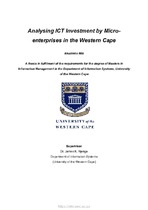| dc.description.abstract | Micro-enterprises solve many socio-economic issues facing developing nations because of their large contribution to economic development and progress. Micro-enterprises have been influenced by the continued globalisation, digitisation and modernisation of business practices. As a result, micro-enterprises’ are investing in Information and Communication Technologies (ICT) to enhance enterprise and economic growth, performance, productivity and a competitive advantage. However, the benefits of these investments are not always realised, often because of the ad hoc nature in which micro-enterprises function and a lack of formalised methods and strategy. When these are not realised, micro-enterprise suffer in terms of competitiveness, performance and returns.
Maturity models, are tools that help solve issues relating to an enterprise’s current status in terms of its capabilities and resources, and how these issues can be improved. Maturity models may present the ideal solution for micro-enterprise to invest in ICT. Larger enterprises have been able to use maturity models for strategic ICT investments realising benefits. The benefits of using maturity models as a guide to ICT investment include: saving on long-term operational and tactical costs, self-evaluation and linking business and ICT strategy among others.
This research sought to determine how micro-enterprises in the Western Cape can use a maturity model in planning strategy for investments in ICT. Data was gathered from micro-enterprises and their stakeholders to find the best maturity model fit. These model fitness considered the entire internal and external environmental factors influencing micro-enterprise ICT investment decision-making.
The research investigated micro-enterprises, their current practices, focus and strategic, tactical and operational behaviour in terms of business and ICT. Of the 34 micro-enterprises that took part, most them knew of the concept of growth and maturity of the enterprise, they used none discernable metric to measure their internal and external activities regarding ICT investment. It highlighted the alignment of business and ICT as a major issue that needed to be addressed in order for micro-enterprises to be competitive, improve performance and returns. The recommended model from the research provides a formalised process that covers both the micro-enterprises internal and external matrices when deciding on the ICT investment to be made. | en_US |

